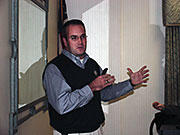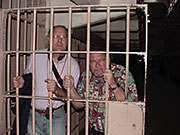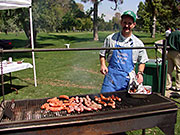
CIOMA Regional Meeting

Alliance Petroleum Meeting

Central Valley Petroleum Industry Golf and Tennis Tournament
Want to see the photos that didn't make the issue? Check out
the Cutting Room
Floor.
Shell
Looks to Buy Texaco Assets from Equilon, Motiva Joint
Ventures
Exxon Dealers Win $500
Million in Damages
Kinder Morgan Acquires
Colton Transmix Plant
Bill to Cut Credit
Card Fees Killed in Montana Senate
Valero Refinery to
Generate Electricity for California
CARB Rethinking Electric
Vehicle Mandate After Power Shortages
SHELL LOOKS TO BUY TEXACO ASSETS FROM EQUILON, MOTIVA JOINT VENTURES
LONDON, ENGLAND — Royal Dutch/Shell Group has confirmed that it is in negotiations to buy out its partner Texaco from the Equilon and Motiva joint ventures.
Shell officials said that the negotiations between the two major oil companies were going "extremely well." The negotiations are being held to try and eliminate any objections that the Federal Trade Commission may have about the pending Chevron-Texaco merger.
In the current partnership configuration, Shell owns 66 percent of Equilon, their West Coast refining and marketing operations, and is expected to acquire Texaco’s 44 percent.
Shell is also expected to buy out Texaco's stake in Motiva, making Shell a 50-50 partner with Saudi Aramco in the Eastern refining and marketing organization.
It is estimated that Shell will acquire the majority of Texaco’s refining and marketing assets for a purchase price of $3.5 to $7 billion.
EXXON DEALERS WIN $500 MILLION IN DAMAGES
HOUSTON, TX. — A group of dealers has been awarded over $500 million in damages from Exxon Corporation after a jury found the major oil company had withheld discounts to the station owners.
On February 20, a U.S. District Court in Miami found that the Exxon Corporation denied discounts they had promised to 10,000 station owners in 35 states between 1982 and 1994.
The jury found that the major oil company held back the discounts by inflating wholesale fuel prices, costing the dealers more money to operate their stations.
The discounts that were offered by Exxon were supposed to offset a 3% "credit card recovery fee," which Exxon charged dealers when customers paid by credit card. Station operators claimed that the discount program only lasted for six months and Exxon overcharged them an average of 1.3 cents per gallon on some 40 billion gallons of fuel to recover their costs from the "discount" program.
The jury sided with the dealers and awarded them $500 million in damages. That total could reach $1 billion with interest.
Exxon has said they will appeal the verdict. Exxon Attorney Larry Stewart explained, "We continue to believe that we provided the offset and gave dealers a very fair price and that ultimately, on appeal, Exxon’s business practices will be vindicated."
KINDER MORGAN ACQUIRES COLTON TRANSMIX PLANT
HOUSTON, TX.— Kinder Morgan Energy Partners has acquired the remaining 50 percent ownership in the Colton transmix processing plant from Duke Energy Merchants. The deal was valued at approximately $11 million.
KMP now owns 100 percent of the facility, which is located in Colton, CA.
"This acquisition strengthens our fee-based, transmix processing business," said Richard Kinder, chairman and CEO of KMP.
"Additionally, we have entered into a 10-year agreement with Duke Energy, which will market the transmix that we process at Colton. This is a great example of two companies working together, as Duke Energy will be able to utilize its marketing skills, and we will be able to focus on our operational expertise."
The Colton processing facility is located on KMP’s property at its Colton terminal and is accessible by pipeline and truck, primarily processing transmix from KMP’s Pacific operations. It has a capacity of processing 5,000 barrels of transmix per day.
KMP is now the largest processor of transmix in the
United States.
BILL TO CUT FEES ON CREDIT CARD SALES KILLED IN MONTANA SENATE
HELENA, MT.— A bill to eliminate credit card fees on gasoline taxes has been defeated in the Montana Senate.
Under the terms of the bill, supported by the Montana Petroleum Marketers Association, credit card companies would be unable to charge gasoline retailers a fee on the fuel taxes that were included in the sale.
The service station owners and jobbers said they were being unfairly charged fees by the credit card companies for monies they were collecting for the government.
"The person who is selling the gasoline is not selling tax," explained Steve Visocan, Visocan Petroleum, Helena, MT. "He’s simply a tax collector. And he winds up paying a fee to the bank for collecting taxes for the state and the federal government."
The bill passed the state Senate with a vote of 27-3 in favor in the first reading. However, it was defeated 26-24 on its second reading. Those lobbying against the bill said its passage would make it more difficult for Montana residents to get credit cards. They argued that credit card companies would not want to do the extra paperwork to comply with the new regulations and would stop issuing credit to the state’s consumers.
According to Ronna Christman of the MPMA, credit
card transactions account for approximately 65 percent
of the gasoline sold in Montana or approximately 650
million gallons annually.
VALERO REFINERY TO GENERATE ELECTRICITY FOR CALIFORNIA
BENICIA, CA. — Valero Energy Corporation will add a $57-million cogeneration plant to the company’s refinery here.
The availability of electrical power has become a major issue in California during the last several months. It is predicted that the increased demand for power in the summer will cause rolling blackouts across the state.
The new gas turbine unit will enable the company to produce 51 megawatts of electricity. The power will be used to run the refinery as well as release enough electricity back to the state’s grid to power approximately 50,000 homes.
"The cogeneration project has been in our plans for a while, but due to the state’s severe power shortage, we decided to put it on the fast track," said Rich Marcogliese, plant manager and vice president of Valero’s Benicia refinery. "It is critical that we keep our refinery running because any power interruption could mean significant downtime, which could ultimately lead to gasoline supply shortages and price spikes."
The Benicia Refinery has a throughput capacity of 165,000 barrels per day and provides 10% of the California’s fuel supplies.
Valero officials have started applying for permits to build the new cogeneration facility. It is expected that the project will be completed in April 2002.
CARB RETHINKING ELECTRIC CAR MANDATE AFTER POWER SHORTAGES
SACRAMENTO, CA. — The California Air Resources Board (CARB) has announced that it is re-evaluating its mandate for electric cars following California’s massive electricity shortages that began at the end of last year.
CARB’s mandate currently would require 4% of the vehicles sold in the state starting with model-year 2003 to be Zero-Emission Vehicles (ZEVs). Electric cars are currently the only technology on the market that would meet the ZEV standards.
CARB is reportedly considering dropping that level to 2% of all vehicles sold.
CARB has also mandated that 8% of vehicles sold will be ultra-low-emission vehicles, beginning in 2003. The government agency is reportedly not looking to change these numbers as a number of fuels could be used to meet this standard including hybrids, CNG, propane, fuel cells, and even ultra-low emissions gasoline.
In addition to the electricity shortages in California, the ZEV requirement is being reconsidered because of the high cost of manufacturing and marketing the electric vehicles.
Originally published in the April 2001 issue of
O&A Marketing News.
Copyright 2001 by KAL Publications Inc.
Serving the 13 Western States, the World's Largest Gasoline, Oil, Fuel, TBA and Automotive Service Market